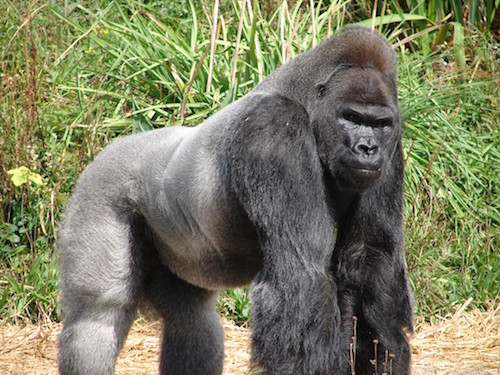 Faith & Science
Faith & Science
 Intelligent Design
Intelligent Design
Killing Harambe — An Intelligent Design Perspective

Over the Memorial Day holiday, zookeepers in Cincinnati made the correct decision to shoot and kill a gorilla, Harambe, to protect a little boy who had fallen into the animal’s enclosure. The same weekend, my family was spending a night vacationing in Vancouver. When we first stepped into our hotel rooms, the thing I immediately noticed was the 17th-floor balcony, totally unprotected but for a flimsy railing. Our twins love to climb, and pay little heed to personal safety. It’s a parent’s nightmare.
For the gorilla’s death, a first response might thus be to look for someone to blame — the kid’s mom, perhaps, for paying too little attention to what her son was doing, or the zoo, for failing to make sure the moat where Harambe was enjoying the water was secure against little climbers.
But the truth is, unfortunate circumstances happen, sometimes unavoidably. Given the choice between ape and boy, the zoo wisely chose to sacrifice the ape. They had no choice. As the legendary National Review editor James Burnham liked to say, “Where there’s no alternative, there’s no problem.” Shoot the gorilla.
End of story? Not quite. Harambe’s death has turned into a flashpoint between Right and Left, addressed today, for example, by Ben Shapiro who writes:
The outrage over Harambe’s death springs from two groups: those who worship nature and those who refuse to acknowledge that sometimes bad things just happen.
…
Animals aren’t children. And human beings aren’t less valuable than animals. A society that treats animals like humans is a society that will treat humans like animals.
So sure, let’s take a moment to be upset about the fate of Harambe — but only a moment. Then let’s remember that our virtue-signaling about the death of a 450-pound gorilla to save the life of a small child isn’t virtuous at all — it’s a sign that our virtue has been twisted in ugly ways that will end with more human suffering in the end.
The impulse is always to react to strong feelings at the death of a “mere” animal by dismissing those feelings as self-indulgent liberal emotionalism. However, the perspective that recognizes design in nature offers a caution against this impulse.
It’s a conservative habit to scold others for listening to feelings over intellect. Emotions, however, once investigated, often turn out to conceal wisdom worthy of respect. Our colleague Wesley Smith kindly supplies me with the reference to ethicist Leon Kass’s 1997 New Republic essay “The Wisdom of Repugnance,” in which Kass argued against human cloning. Kass pointed to how “in crucial cases… repugnance is the emotional expression of deep wisdom, beyond reason’s power fully to articulate.”
If that’s true of disgust, then maybe it’s also true of the instinctive response of wonder and exalted admiration when confronted with a gorilla. Such a creature directs our attention to a transcendent care for awesome beauty, hidden just behind the veil of nature. Add to this the animal’s critically endangered status, and is there enough to justify more than a dismissive “moment to be upset” about Harambe’s death? I think so.
The design in nature extends everywhere, to animals and plants of all kinds. Yes, each has its place, and typically that place subordinates one to another, with all being subordinated to man. That is one of those pre-philosophic axioms that John Zmirak referred to yesterday in discussing Richard Weikart’s book The Death of Humanity (see “Here’s What Happens When You Eliminate Science’s Spiritual Foundations“). We eat plants freely, and we eat (some) animals. There was, again, no decent choice as to whether to sacrifice an ape to save a boy.
But this shouldn’t negate feeling shocked, even outraged, at the gorilla’s death if it could have in any way been avoided. We are entitled not only to experience such a feeling but also to justify it on rational grounds. Even if the death could not have been avoided, sensitive and thoughtful people should not dismiss our intuitive response — mourning the destruction of a magnificent and rare monument to intelligent design.
Photo credit: Antony from Gloucester, UK [CC BY-SA 2.0], via Wikimedia Commons.
